|
|
|
Sort Order |
|
|
|
Items / Page
|
|
|
|
|
|
|
| Srl | Item |
| 1 |
ID:
159682
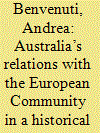

|
|
|
|
|
| Summary/Abstract |
In 2015, Australia and the European Union successfully negotiated a Framework Agreement. This agreement is an essential step in establishing a stronger Australia–European Union partnership and achieving closer bilateral cooperation. For years, negotiating such an agreement had proved impossible. In the 1970s, successive Australian governments showed interest in enhanced collaboration with the European Community, but the political climate for closer relations was far from encouraging. This article explains why this was the case. In doing so, it also explores how the Whitlam and Fraser governments envisaged, framed and developed Australia’s ties with the European Community in the 1970s, and asks whether a more positive approach on their part could have led to a stronger relationship. Based on recently declassified government files, this article shows that although both Whitlam and Fraser fully grasped the importance of the European Community as an emerging international actor and were willing to deepen Australia’s ties with it, significant constraints existed against enhanced bilateral cooperation. With the Common Agricultural Policy still a considerable challenge to Australian economic interests and with the European Community focused mainly on the management of its internal market, broader political considerations were inevitably relegated to the margins of Australia–European Community consultations.
|
|
|
|
|
|
|
|
|
|
|
|
|
|
|
|
| 2 |
ID:
167810
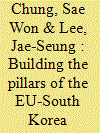

|
|
|
|
|
| Summary/Abstract |
This paper explores the evolution of the policy agenda of the EU-South Korea strategic partnership, based on key pillars of cooperation: politics, security, and economics. In the political arena, the Framework Agreement has provided a major platform for promoting EU-Korea political dialogue and developing a common stance toward a shared global agenda. When it comes to security, the main agenda involves North Korea’s missiles, nuclear program, and the challenge of nonproliferation; the two parties have coordinated sanctions against North Korea. South Korea has enacted a Crisis Management Participation Agreement (FPA) with the EU and begun to participate in the EU common security and defence policy. The changing security environment on the Korean Peninsula, as a consequence of recent inter-Korean and US-North Korea dialogues, may offer the EU new opportunities for constructive engagement. In the economic arena, the EU-Korea FTA has established solid trade and investment relations. While these pillars of the strategic partnership have led to stable and mature bilateral relations, both the EU and South Korea need to find new momentum for an enhanced partnership to deal with the ongoing challenge of global security instability and the backlash against the liberal international order. The EU-South Korea strategic partnership also needs a global agenda that covers climate change, technology, education, and culture. This study assesses the development of each pillar of the strategic partnership, addressing key challenges, tasks, and future diplomatic developments between the EU and South Korea.
|
|
|
|
|
|
|
|
|
|
|
|
|
|
|
|
| 3 |
ID:
118584
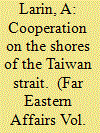

|
|
|
|
|
| Publication |
2012.
|
| Summary/Abstract |
With the Kuomintang coming to power in Taiwan, relations between the island and the mainland entered a new phase distinguished by a qualitative intensification of economic integration, expanded contacts, and substantial improvement in the overall political atmosphere. Recognition of the Consensus of 1992 by both sides served as the foundation for further progress. The idea of concluding a peace treaty is under discussion, but the ambivalent attitude toward such an agreement among the Taiwanese (and possibly the PRC leadership) is a major stumbling block. The United States is not interested in Taiwan's independence movement, although it has no objection to selling Taipei military hardware. On the whole, the peaceful development of relations between the shores of the Taiwan Strait is distinguished by considerable stability.
|
|
|
|
|
|
|
|
|
|
|
|
|
|
|
|
| 4 |
ID:
129122
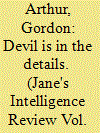

|
|
|
| 5 |
ID:
113256
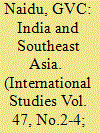

|
|
|
|
|
| Publication |
2010.
|
| Summary/Abstract |
Southeast Asia has always occupied a unique place in India's external relations since ancient times but colonialism, followed by the Cold War, severely hampered these links. These could only be revived in the early 1990s, driven by economic and political exigencies, through what is called the 'Look East' policy. It has since gathered enormous momentum and evolved into a comprehensive approach encompassing economic, political and strategic facets. Despite being a relatively minor player economically, India's importance in the emerging regional order is becoming vital. Its engagement of East Asia cannot be construed as the loss of Southeast Asia. The region will continue to remain India's major focus because of its geostrategic significance and the instrumental value of the Association of Southeast Asian Nations (ASEAN).
|
|
|
|
|
|
|
|
|
|
|
|
|
|
|
|
|
|
|
|
|